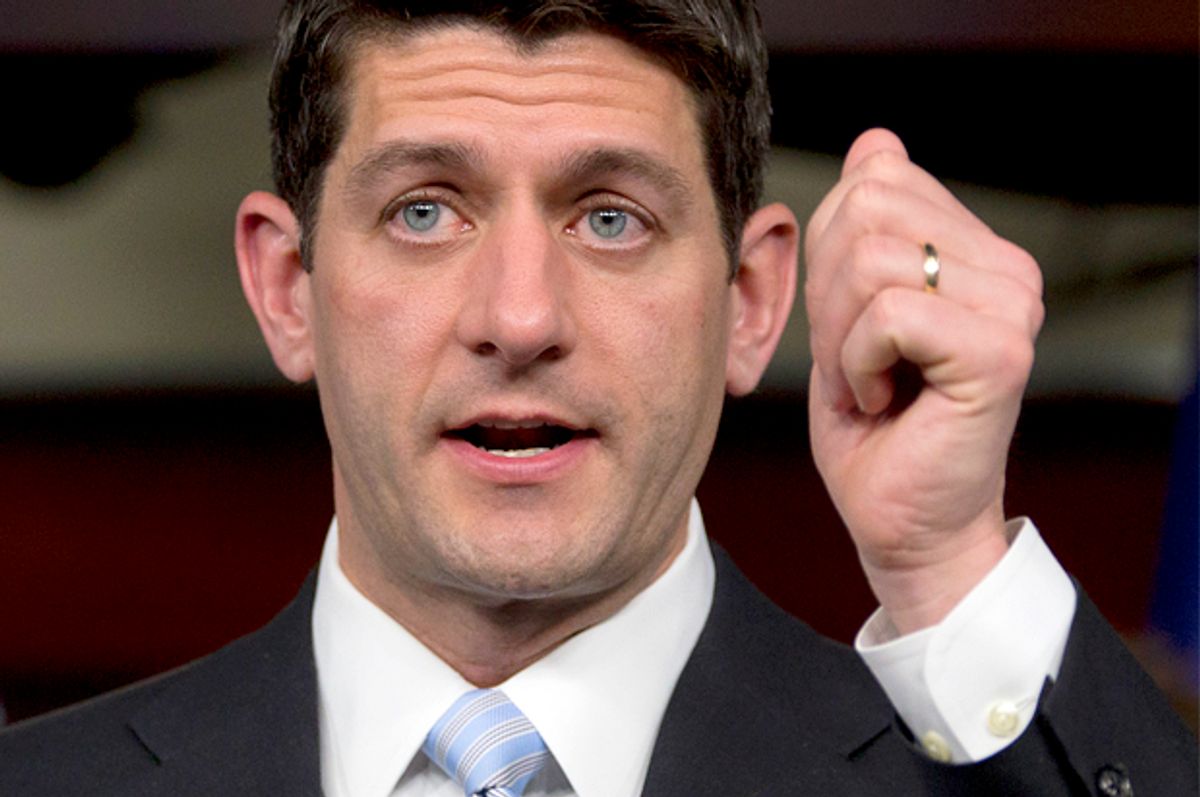Oral arguments in King v. Burwell are a mere 24 hours away and we have yet another Republican “plan” for what to do should the Supreme Court strike down the Affordable Care Act’s insurance subsidies in 37 states. The preferred method for announcing these plans seems to be via newspaper Op-Ed, and the latest can be found in this morning’s Wall Street Journal, courtesy of Reps. Paul Ryan, John Kline, and Fred Upton.
First off, I have to give Ryan, Kline, and Upton some credit – their “plan” is more specific than the proposal put forth by Orrin Hatch and friends, and meatier than former Sen. Phil Gramm’s “freedom option.” Of course, that’s a very low bar for them to clear (those other “plans” had no actual specifics) and the Ryan-Kline-Upton scheme is still absurdly vague and raises far more questions than it answers.
The Ryan-Kline-Upton plan allows for states to opt out of the Affordable Care Act’s various mandates, enables people to purchase insurance across state lines, and calls for tort reform – the standard conservative health reform policy grab bag. But while the authors bear obvious antipathy towards Obamacare, they also propose retaining some of its more popular features:
At the same time, we would set up other safeguards for patients. We would allow parents to keep children on their plan until age 26. We would prohibit insurers from imposing lifetime limits on benefits. We would protect people with existing conditions. And we would guarantee renewability for people already enrolled in a plan.
“We would protect people with existing conditions.” Sounds good! But, what does that mean? If they intend to retain the ACA’s blanket prohibition on insurers discriminating against people with pre-existing conditions, it seems like they would have just said so. Are they replacing it with something else? It's a hugely important question, and they just gloss over it with a vague promise that protections will be in place. The ACA’s coverage guarantee for people with pre-existing conditions is hated by conservatives but also one of the law’s most popular features, which probably explains why these three Republicans are being cagey about its fate.
But here’s what I find strange about all this: Paul Ryan is already on record saying that these popular Obamacare provisions have to go. Last April he told Bloomberg’s Al Hunt that by banning discrimination based on pre-existing conditions and by allowing kids to remain on their parents’ health plans, the Affordable Care Act was driving health insurance costs beyond the point that people could afford. “If you look at these kinds of reforms, where they've been tried before — say the state of Kentucky, for example — you basically make it impossible to underwrite insurance,” he said. “You dramatically crank up the cost. And you make it hard for people to get affordable health care.”
That statement was in line with the general Republican philosophy that health insurers should be a lightly regulated as possible and free to discriminate against whomever they choose. Has Ryan gone wobbly on that principle? Why is Paul Ryan signing off on Obamacare’s regulation of the insurance market? Are these measures being granted only a temporary reprieve as part of a transition away from the Affordable Care Act?
Other bits of policy weirdness abound. The new Ryan-Kline-Upton plan calls for replacing Obamacare's subsidies with a refundable tax credit to help purchase insurance. Ryan has pushed something similar before, but he proposed paying for it by ending the tax preference for employer-based insurance. The Ryan-Kline-Upton Op-ed, however, makes no mention of a funding mechanism, and seems to leave open the possibility that the tax preference and the new tax credits will exist side by side:
Second, help people buy coverage. Right now, those who get insurance through their employer get a lot of help from the tax code, while some people who buy insurance on their own, including potentially the millions of Americans the IRS put at risk, get no help at all. So we would offer those in the affected states a tax credit to buy insurance.
Again, it’s all very vague – but that’s the point. They’re leaving an extraordinarily rosy impression of what they have planned for a post-King environment in which all the popular parts of Obamacare remain while all the unpopular parts are expunged, and everyone’s insurance choices are plentiful and affordable. This Op-Ed and the ones that preceded it are more about these Republicans saying they have a terrific plan than it is about actually having a real plan. Given that one of the primary authors of this “plan” has argued strongly against some of the policy proposals he’s now putting forward, it’s difficult to believe that they’re presenting this in good faith.

Shares